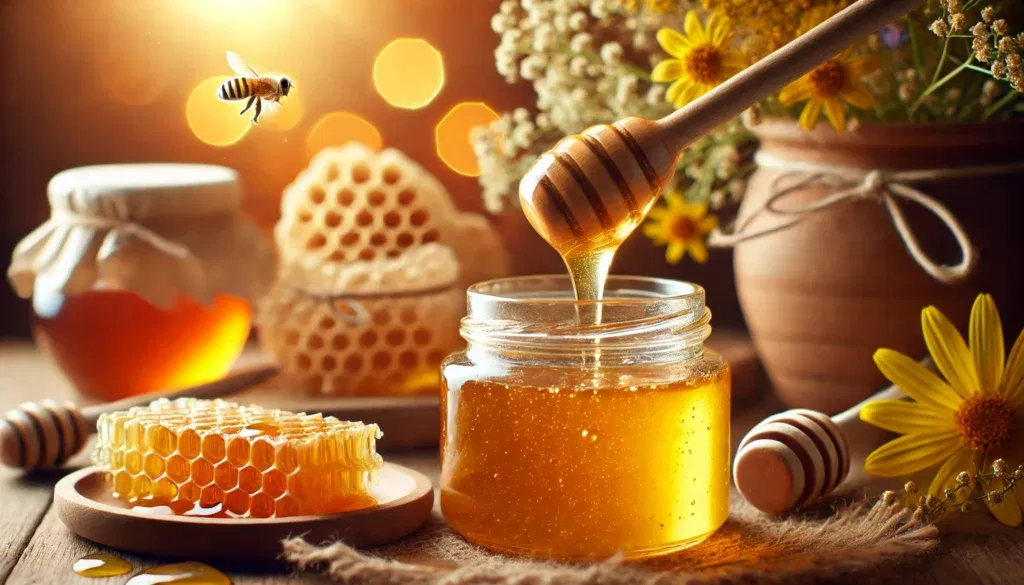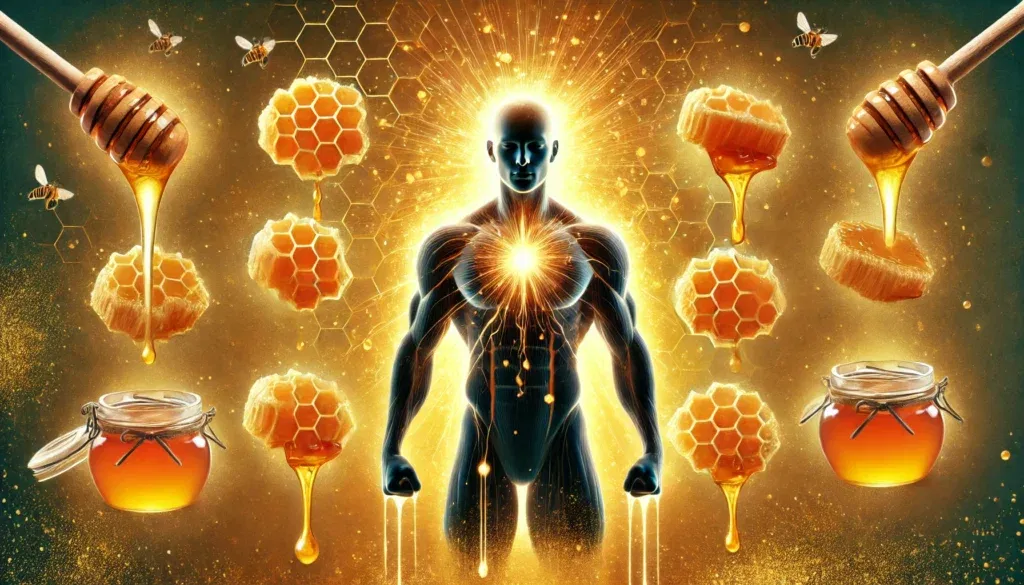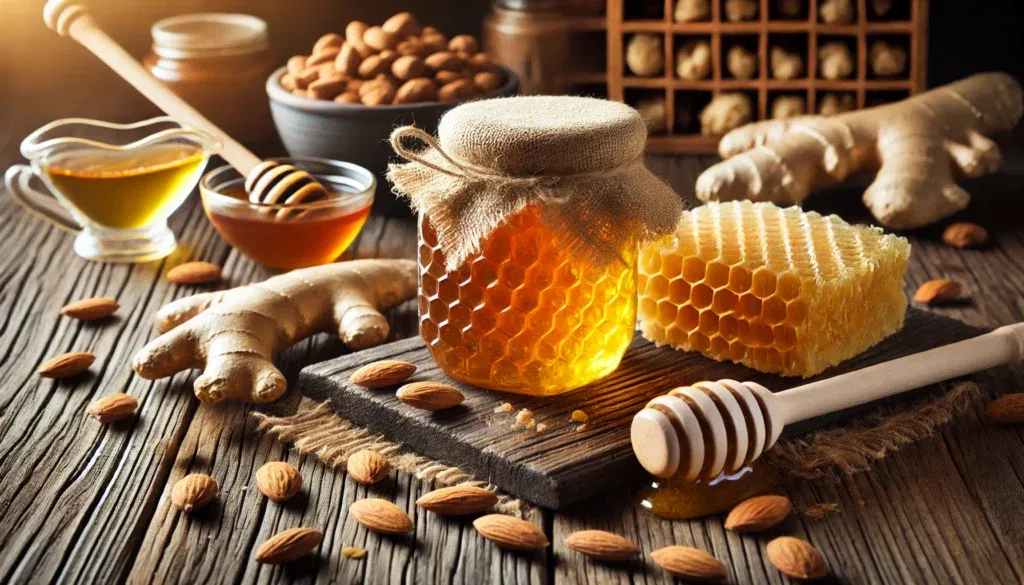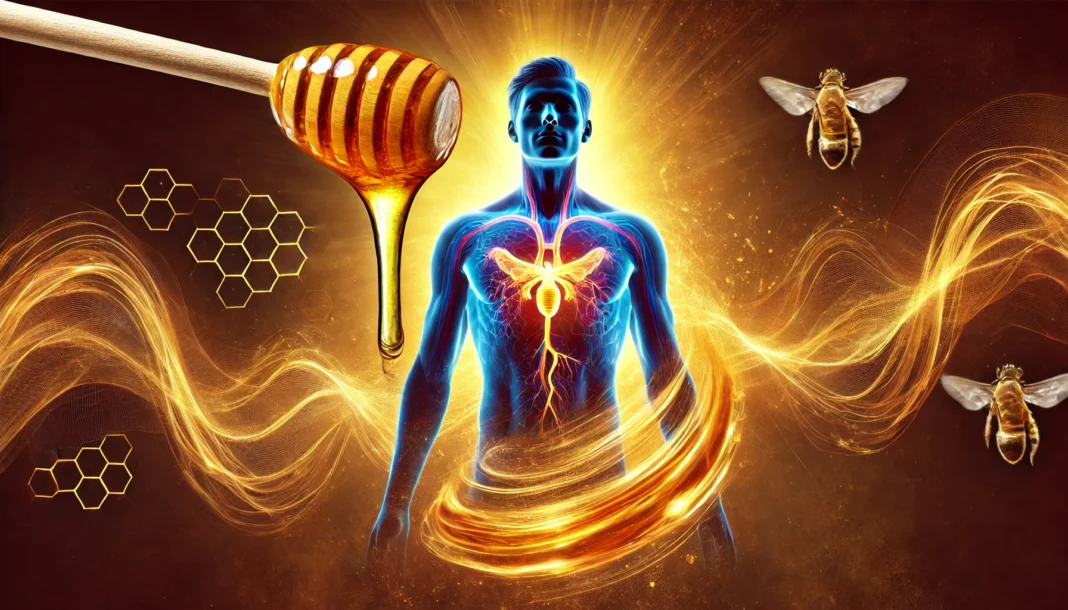Understanding the Role of Testosterone in Men’s Health
Testosterone is a crucial hormone responsible for regulating various aspects of male health, including muscle growth, fat distribution, bone density, and libido. It plays a central role in maintaining overall vitality, energy levels, and cognitive function. As men age, testosterone levels naturally decline, leading to symptoms such as fatigue, decreased strength, mood swings, and reduced sexual drive. This decline has led many men to seek natural methods to support healthy testosterone production, including dietary and lifestyle changes.
You may also like: How to Increase Testosterone Levels Naturally: Science-Backed Strategies for Men’s Health & Longevity
Among the many food sources purported to aid testosterone levels, raw honey has gained significant attention. It has been suggested that the natural enzymes, antioxidants, and nutrients in honey may contribute to hormone regulation. However, the question remains: does raw honey truly boost testosterone, or is this merely a health myth? In this comprehensive exploration, we will examine the nutritional profile of raw honey, its potential effects on hormone levels, and how it compares to other testosterone-supporting foods.

The Nutritional Composition of Raw Honey
Raw honey is far more than just a natural sweetener. Unlike processed honey, which is heated and filtered, raw honey retains a wealth of bioactive compounds that contribute to its potential health benefits. It contains natural sugars such as fructose and glucose, small amounts of protein, and an array of vitamins and minerals, including B vitamins, vitamin C, calcium, magnesium, potassium, and zinc. These nutrients play an integral role in supporting overall health, including endocrine function.
One of the most intriguing components of raw honey is its flavonoids and polyphenols—antioxidants known for their anti-inflammatory and immune-boosting properties. Certain bioactive compounds in honey, such as quercetin and chrysin, have been studied for their potential effects on testosterone production. These antioxidants may help reduce oxidative stress, which is a known factor in testosterone decline, particularly in aging men.
Raw honey also contains trace amounts of amino acids, such as arginine, which plays a role in nitric oxide production. Nitric oxide is essential for blood flow and vascular health, indirectly contributing to testosterone function by supporting improved circulation to reproductive organs. These nutritional attributes suggest that raw honey has potential benefits beyond simple energy provision, warranting further exploration into its impact on hormonal balance.
Raw Honey and Testosterone: Examining the Evidence
Scientific studies examining the direct relationship between raw honey and testosterone levels are still in their early stages. However, some research suggests that certain compounds in raw honey may positively influence hormonal health. One of the primary ways raw honey is thought to impact testosterone production is through its antioxidant content. Oxidative stress is known to interfere with Leydig cell function in the testes, which are responsible for testosterone synthesis. By reducing oxidative damage, raw honey may help create a more favorable environment for natural hormone production.
A study published in the Journal of Applied Physiology and Nutrition found that chrysin, a flavonoid present in raw honey, has the potential to inhibit the aromatase enzyme. Aromatase is responsible for converting testosterone into estrogen, and its inhibition could theoretically help maintain higher levels of testosterone. However, human studies on this effect remain limited, and further research is needed to confirm these findings in real-world applications.
Additionally, raw honey’s ability to regulate blood sugar levels may also play an indirect role in supporting testosterone. Chronic blood sugar imbalances and insulin resistance have been linked to lower testosterone levels. Since raw honey has a lower glycemic index than processed sugars, it may contribute to better metabolic health and indirectly support hormone balance. While these findings are promising, it is essential to recognize that raw honey alone is unlikely to produce a dramatic increase in testosterone levels without a comprehensive approach that includes a balanced diet, exercise, and lifestyle modifications.
Comparing Raw Honey to Other Testosterone-Boosting Foods
While raw honey has potential benefits for hormonal health, it is not the only natural food associated with testosterone support. Several other foods have been extensively researched for their ability to enhance testosterone production. For instance, foods rich in healthy fats, such as avocados, nuts, and olive oil, provide essential building blocks for testosterone synthesis. Cholesterol-derived hormones like testosterone require dietary fat for proper production, making these foods valuable additions to a testosterone-supporting diet.
Zinc-rich foods such as oysters, beef, and pumpkin seeds are also crucial for maintaining optimal testosterone levels. Zinc plays a direct role in inhibiting aromatase activity, similar to chrysin in raw honey, and supports testicular function. Additionally, cruciferous vegetables like broccoli and Brussels sprouts contain compounds that may help regulate estrogen levels, allowing testosterone to remain in balance.
When comparing raw honey to these other foods, its primary advantage lies in its antioxidant content and potential metabolic benefits. While it may not directly stimulate testosterone production to the same degree as foods high in zinc or healthy fats, its ability to support overall health through reduced oxidative stress and improved blood sugar regulation makes it a complementary addition to a testosterone-friendly diet.
How to Incorporate Raw Honey for Maximum Benefits
For those looking to integrate raw honey into their diet for potential testosterone support, moderation and strategic consumption are key. While raw honey offers various health benefits, excessive intake can contribute to excessive sugar consumption, potentially leading to metabolic disturbances. A balanced approach is necessary to reap its advantages without unintended consequences.
One effective way to incorporate raw honey is by using it as a natural sweetener in nutrient-dense meals. Adding a teaspoon of raw honey to herbal teas, oatmeal, or yogurt can enhance both flavor and nutritional value. Combining raw honey with testosterone-supporting foods, such as pairing it with Greek yogurt or nuts, may amplify its benefits. Additionally, using raw honey in post-workout nutrition can provide quick energy and help support recovery without relying on processed sugars.
Timing may also play a role in maximizing the benefits of raw honey. Consuming it in the morning with a high-protein breakfast can provide sustained energy throughout the day while supporting stable blood sugar levels. Alternatively, using raw honey in combination with other natural testosterone boosters, such as ginger or cinnamon, may further enhance its effects. These spices have been studied for their potential role in improving testosterone levels and metabolic function, making them excellent companions to raw honey in dietary applications.

Frequently Asked Questions (FAQ) on Honey and Testosterone
1. Does raw honey boost testosterone naturally?
Yes, raw honey can play a role in supporting healthy testosterone levels. Unlike processed honey, raw honey retains its natural enzymes, antioxidants, and bioactive compounds that may contribute to hormonal balance. It contains boron, a trace mineral linked to improved testosterone metabolism. Additionally, raw honey has anti-inflammatory and antimicrobial properties that help reduce oxidative stress—a known factor in hormone disruption. While it should not be considered a standalone solution, incorporating raw honey into a balanced diet can be beneficial for overall hormonal health.
2. What is the best honey for testosterone support?
The best honey for testosterone is typically raw, unfiltered, and sourced from nutrient-rich floral regions. Manuka honey, for example, is known for its superior antibacterial properties and may contribute to gut health, which is indirectly linked to hormonal regulation. Wildflower honey is another excellent option, as it contains a diverse range of pollen and antioxidants that may support endocrine function. Darker honey varieties often have higher levels of flavonoids and polyphenols, which combat oxidative stress and promote better testosterone balance. Choosing organic, unprocessed honey ensures you receive the full range of natural benefits without additives or refined sugars.
3. How does raw honey compare to processed honey for testosterone?
Raw honey testosterone benefits outweigh those of processed honey due to its unaltered composition. When honey undergoes pasteurization and filtration, many of its natural enzymes, vitamins, and polyphenols are lost. These compounds are crucial in supporting overall metabolic functions, including those related to testosterone production. Processed honey is also more likely to contain added sugars, which can contribute to insulin resistance—a factor that negatively impacts testosterone levels. Opting for raw honey ensures you are consuming a product that retains its bioactive compounds for optimal health benefits.
4. Can raw honey alone significantly increase testosterone levels?
While raw honey has properties that support testosterone production, it should not be relied upon as a singular solution. Testosterone regulation is a complex process influenced by diet, exercise, sleep, and overall lifestyle choices. The compounds found in raw honey, such as boron and flavonoids, can aid in reducing oxidative stress and supporting endocrine health, but they work best when combined with a nutritious diet, strength training, and adequate sleep. Incorporating raw honey into a testosterone-boosting regimen is a smart choice, but it should be part of a holistic approach.
5. How can I incorporate the best honey for testosterone into my diet?
Incorporating the best honey for testosterone into your diet can be both simple and delicious. Drizzling raw honey over oatmeal, mixing it into Greek yogurt, or adding it to a smoothie provides a natural energy boost while supporting hormone balance. Pairing honey with nuts, such as almonds or walnuts, enhances its benefits by supplying healthy fats and essential minerals. You can also create a pre-workout honey-infused drink with lemon and ginger to maximize its metabolic and anti-inflammatory properties. Choosing raw honey over refined sweeteners ensures you receive its full nutritional benefits.
6. Does raw honey boost testosterone when combined with certain foods?
Yes, pairing raw honey with testosterone-supporting foods can enhance its effects. Foods rich in zinc, such as oysters and pumpkin seeds, work synergistically with honey to promote hormone production. Healthy fats from avocados and olive oil also complement raw honey’s anti-inflammatory properties, creating a well-rounded approach to hormonal balance. Additionally, combining honey with ashwagandha—a well-researched adaptogen known for its testosterone-boosting properties—can provide further endocrine support. The combination of raw honey with nutrient-dense foods amplifies its natural benefits for testosterone health.
7. How does raw honey’s effect on insulin impact testosterone levels?
Raw honey testosterone benefits include its ability to regulate blood sugar levels more effectively than refined sugars. High insulin levels are associated with lower testosterone production due to increased fat accumulation and hormonal imbalances. Unlike processed sweeteners, raw honey has a lower glycemic impact and provides antioxidants that mitigate insulin resistance. Moderate consumption of raw honey can support metabolic health, thereby promoting a more favorable environment for testosterone synthesis. Keeping insulin levels stable is essential for maintaining optimal testosterone function.
8. Are there any risks of consuming too much honey for testosterone support?
While raw honey is beneficial, excessive consumption can lead to unintended consequences. Overconsumption may contribute to excess calorie intake, leading to weight gain and potential metabolic imbalances that can suppress testosterone. Additionally, despite its lower glycemic index, excessive honey intake can still elevate blood sugar levels if not consumed in moderation. It is best to limit daily intake to one to two tablespoons and pair it with fiber-rich or protein-dense foods to slow sugar absorption. Moderation ensures you maximize raw honey’s testosterone-boosting effects without negative repercussions.
9. How does honey influence cortisol levels, and why does that matter for testosterone?
Cortisol, the stress hormone, has an inverse relationship with testosterone—when cortisol is high, testosterone levels often drop. Raw honey contains compounds that support adrenal health and help regulate the body’s stress response. The antioxidants in raw honey can lower oxidative stress, reducing the body’s tendency to produce excessive cortisol. Consuming honey before bed, particularly with warm milk or herbal tea, can promote relaxation and improve sleep quality, which is crucial for testosterone synthesis. Keeping cortisol levels in check supports a more favorable hormonal balance for testosterone production.
10. Does raw honey boost testosterone differently for athletes and non-athletes?
Athletes may experience amplified raw honey testosterone benefits due to their increased metabolic demands and higher reliance on nutrient timing. Raw honey serves as a natural pre- or post-workout energy source, replenishing glycogen stores without causing an insulin spike that could interfere with testosterone synthesis. For non-athletes, the benefits of raw honey on testosterone may manifest more gradually, as their hormonal needs and energy expenditures differ. However, in both cases, honey contributes to overall metabolic health and provides essential nutrients that support optimal endocrine function. Regular physical activity combined with raw honey intake enhances its effectiveness in maintaining testosterone balance.

The Verdict: Can Raw Honey Truly Boost Testosterone?
The notion that raw honey is a miraculous testosterone booster is not entirely supported by scientific evidence, but its nutrient composition and potential effects on oxidative stress, aromatase inhibition, and metabolic health suggest that it may contribute to a supportive hormonal environment. While it is unlikely to single-handedly elevate testosterone levels significantly, raw honey can be a valuable addition to a well-rounded diet aimed at optimizing hormonal health.
Ultimately, testosterone levels are influenced by a complex interplay of factors, including diet, physical activity, sleep quality, and stress management. Incorporating raw honey as part of a balanced lifestyle, rather than relying on it as a sole solution, is the most effective way to harness its potential benefits. When combined with other testosterone-supporting foods and healthy habits, raw honey can play a meaningful role in maintaining optimal male health and vitality.
testosterone boosting foods, best natural testosterone boosters, raw honey benefits for men, antioxidant-rich foods for hormone health, natural ways to increase testosterone, does honey help testosterone, chrysin and testosterone, best foods for hormone balance, natural sweeteners and testosterone, men’s health nutrition, raw honey and metabolic health, boosting testosterone naturally, flavonoids and hormone health, nitric oxide and testosterone, best diets for testosterone support, honey and men’s vitality, testosterone friendly diet, natural aromatase inhibitors, men’s hormonal health, improving testosterone levels naturally
Further Reading:
Mechanisms of honey on testosterone levels
What Are the Natural Ways to Boost Testosterone?
Disclaimer: The information provided in this article is for general informational purposes only. The content does not constitute professional advice of any kind, including but not limited to medical, legal, or financial advice. HisHealthMag and its contributors make no representations or warranties regarding the accuracy, completeness, or reliability of the information presented. Always seek the advice of a qualified professional for any specific concerns or questions you may have. Neither HisHealthMag nor its authors assume any responsibility or liability for any actions taken based on the information provided in this article. The views and opinions expressed are those of the author(s) and do not necessarily reflect the official policy or position of HisHealthMag.





